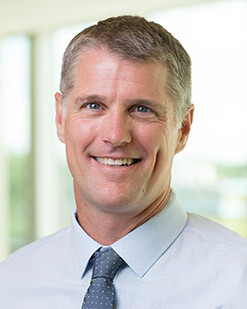William J. Janssen, MD

Dr. William Janssen is a fellowship-trained pulmonologist who specializes in critical care medicine, COPD, septic shock, acute lung injury and ARDS.
Special Interests
Clinical Interests
My clinical interests are in critical care medicine and chronic obstructive pulmonary disease. I also specialize in the treatment of septic shock, acute lung injury, and ARDS (acute respiratory distress syndrome).
Research Interests
My research is focused on mechanisms of repair following acute and chronic lung injury. This includes studying how lung collectins influence alveolar macrophage phenotype, function, and fate in healthy lungs and during inflammation. I am also interested in the role that bone-marrow-derived stem cells (including endothelial progenitor cells) play in recovery from lung injury.
Education
Education
- 1994 - 1998
- The Ohio State University, MD
- 1993
- The Ohio State University, BS, Mechanical Engineering
Residency
- 1998 - 2001
- The Ohio State University, Internal Medicine
Fellowship
- 2002 - 2005
- University of Colorado Denver, Pulmonary and Critical Care
Awards & Recognition
2014: Best Doctors in America, Best Doctors, Inc.
Board Certification
Internal Medicine,
Pulmonary Medicine,
Critical Care
Professional Memberships
American Thoracic Society
Society of Critical Care Medicine
American College of Chest Physicians
Publications
Sareli AE, Janssen WJ, Sterman D, Saint S, Pyeritz RF. What’s the connection? New Eng J. Med. 2008; 358(6):626-32.
Ezzie E, Janssen WJ, O’Brien, JM, Fox C, Schwarz MI. Failure to respond, New Eng J Med. 2008; 358(1):70-4.
Linderman DL, Janssen WJ. Critical care medicine for the hospitalist. Med Clin N. America 2008;92:467–479.
Janssen WJ, McPhillips KA, Dickinson MG, Derek J. Linderman DJ, Morimoto K, Xiao YQ, Oldham KM, Vandivier RW,Henson PM, Gardai SJ.Surfactant Proteins A and D Tonically Suppress Alveolar Macrophage Phagocytosis via Interaction with SIRP?. Am J Respir Cell Crit Care Med. 2008;178)2):158-67
McPhillips K, Janssen WJ, Ghosh M, Byrne A, Gardai SJ, Remigio L, Bratton DL, Kang JL, Henson PM. TNFa inhibits macrophage clearance of apoptotic cells via cPLA2 and oxidant-dependent mechanisms. J Immunol. 2007;178(12):8117-2612.
Hospital Affiliations
- Colorado Acute Long Term Hospital
- Exempla Lutheran Medical Center
- Rose Medical Center
- Sky Ridge Medical Center
- St. Joseph Hospital - Denver
- Swedish Medical Center
- University of Colorado Hospital
Academic Affiliations
Assistant Professor of Medicine, University of Colorado Denver
Conflicts of Interest
National Jewish Health physicians and scientists may collaborate with pharmaceutical or other industries to develop medical and scientific breakthroughs or to provide education on trends in quality medical practice and outcomes to physicians and health professionals around the country. National Jewish Health maintains a strict conflict of interest policy to ensure that all potential conflicts are clearly visible and that management plans are put in place in order to further innovation and education while ensuring the protection of our patients and the integrity of our research. National Jewish Health publicly discloses any payment to our physicians or scientists. View this faculty member’s industry relationships and collaborations.
